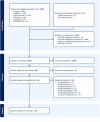Effectiveness of wearable activity trackers on physical activity among adolescents in school-based settings: a systematic review and meta-analysis
- PMID: 40102761
- PMCID: PMC11921619
- DOI: 10.1186/s12889-025-22170-z
Effectiveness of wearable activity trackers on physical activity among adolescents in school-based settings: a systematic review and meta-analysis
Abstract
Background: While inactivity and sedentarism among adolescents are increasing globally, technology-based interventions incorporating wearable activity trackers (WATs) demonstrate the potential to combat the situation. With a focus on schools as critical environments in which to perform interventions among adolescents, this meta-analytic review of literature aimed to examine the effectiveness of wearable trackers in objectively measured physical activity (PA).
Methods: A systematic search was conducted across six databases-PubMed, CENTRAL, Scopus, SPORTDiscus, the Web of Science Core Collection, and PsycINFO-between January 2012 and March 2024. The language was restricted to English only. Both randomized controlled trials and quasi-experiment studies were included. Risk of bias was assessed using Cochrane RoB2 and ROBINS-I tools. Subgroup analyses and sensitivity analyses were performed. Effect direction for a narrative synthesis was also conducted. GRADE criteria were applied to assess quality of evidence.
Results: Fifteen studies were finally included in the literature review, and ten were adopted for meta-analysis. No statistical significance was found in intervention outcomes involving WATs' effect on PA, whether in terms of total daily steps, moderate-to-vigorous PA (MVPA), or calorie counts. However, the subgroup analysis revealed that one study using research-grade assessment showed a substantial positive effect on steps. There were no data reported regarding the effect of objectively measured sedentary behavior.
Conclusion: Further study is needed to explore whether wearable activity trackers raise or decrease PA among adolescents in schools.
Registration: PROSPERO, registration number: CRD42023421008.
Keywords: Adolescents; Physical activity; Schools; Wearable activity trackers.
© 2025. The Author(s).
Conflict of interest statement
Ethics approval and consent to participate: Not applicable. Consent for publication: Not applicable. Competing interests: The authors declare no competing interests.
Figures



References
-
- Guthold R, Stevens GA, Riley LM, Bull FC. Worldwide trends in insufficient physical activity from 2001 to 2016: a pooled analysis of 358 population-based surveys with 1·9 million participants. Lancet Glob Health. 2018;6:e1077–86. - PubMed
Publication types
MeSH terms
Grants and funding
LinkOut - more resources
Full Text Sources
Medical

